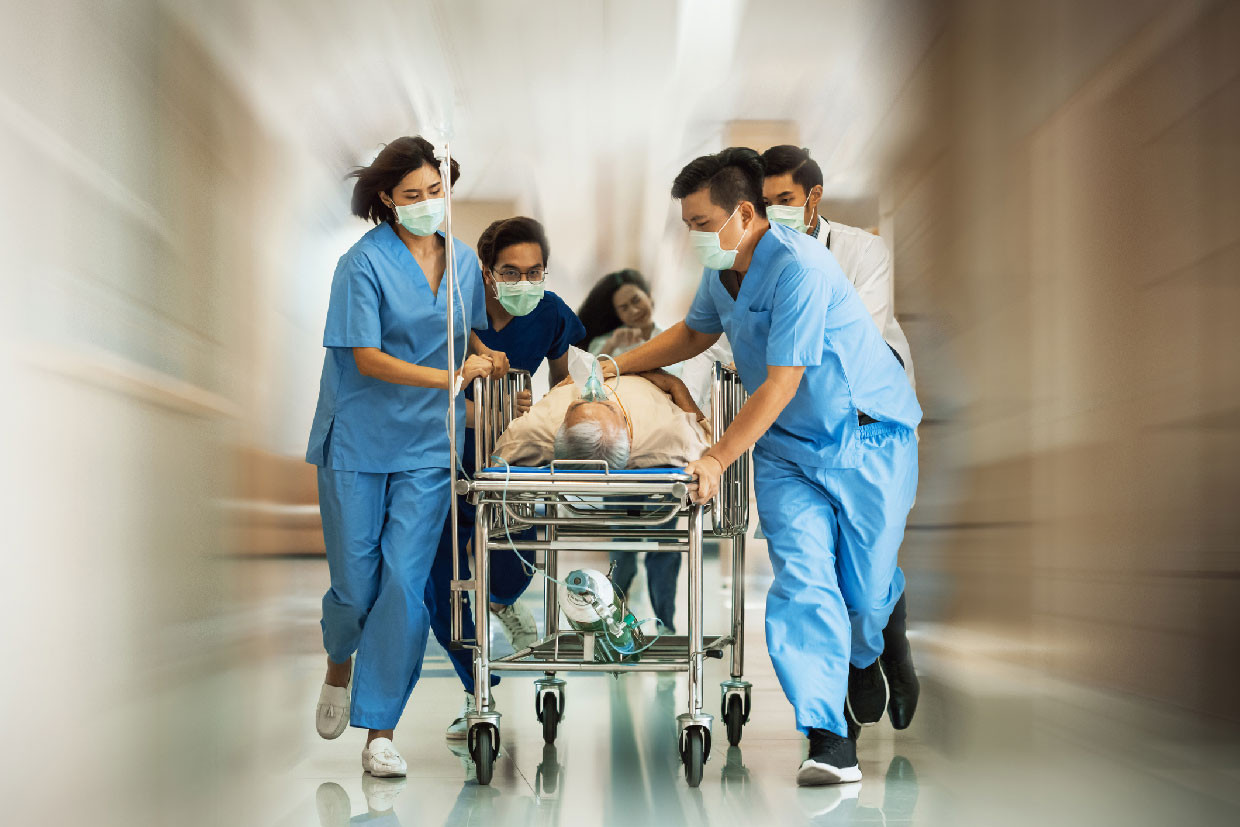Geriatric Accident & Emergency Center
Elderly patients in critical condition: More than 14,510 cases have safely returned home.
(Data for the years 2019-2023)
- Awarded the Geriatrics Emergency Department (GEDA) standard of care for the elderly, making us the first and only hospital in Southeast Asia to achieve the Silver Standard level and the first hospital outside the United States to receive this recognition.
- Over 300,000 elderly patients aged 60 years and above received care and treatment at our age-friendly hospital between 2003 and 2022.
- We have implemented a trauma code system to ensure the highest efficiency in care during emergencies for injured patients.
- Our emergency ambulances operate 24 hours a day and can be dispatched within 2 minutes.
- Injured patients are assessed by emergency medicine specialists within 1 minute of their arrival at the center
Clinical outcomes:
- Over 95% of patients who undergo arthroscopic surgery on a shoulder or elbow/knee joint return home within 24-48 hours after their procedure.
- Hip replacement surgery is performed within 48 hours of arrival.
- Successful hip fracture treatments enable 85% of patients to begin walking within 2 days.
Understanding that elderly patients are a vulnerable group and require special care even in emergency situations, the hospital provides high quality elderly emergency services to reduce anxiety and increase safety for these patients.
Medical Team
Our geriatric-focused multidisciplinary Emergency Team provides coordinated care for the elderly. The safe care we provide elderly accident patients is ensured by our team of emergency doctors, specialized doctors, experienced nurses and staff who are experts in caring for elderly patients in emergency situations. Our services, beginning at the scene and continuing at the hospital, are administered by the skilled hands of our expert team, achieving a significant reduction in adverse outcomes and mortality.
Our multidisciplinary care team consists of specialized doctors in various fields of elderly care, professors, and surgical specialists who are internationally certified and available for consultation 24 hours a day. They include:
- General surgeons specializing in general surgery, orthopedic surgery, cardiovascular surgery, facial plastic surgery, urological surgery, gastrointestinal surgery, hepatobiliary surgery, and colorectal surgery.
- Geriatric consultation team, led by a board certified Geriatrician and geriatric-focus nurse practitioners.
- Emergency nurses well trained in basic and advanced life support and emergency care for critically injured patients.
- Emergency Medical Technicians (EMTs) certified to international standards for patient treatment and transfer.
- Pharmacist team.
- Physical therapists providing treatment and prevention programs.
- Injury prevention team trained to develop patient care using data and statistics to promote safety within the community.
Medical Technology for Diagnosis, Treatment, and Life Support
- Operating rooms employ high standards of care in modern facilities that are available for surgeries 24 hours a day.
- Advanced medical technology in the tools and equipment utilized for diagnosing orthopedic conditions, such as X-ray, ultrasound, and magnetic resonance imaging (MRI) devices.
- ECMO (extracorporeal membrane oxygenation) machines, which are artificial heart and lung devices used to care for critically ill patients when those organs cannot function properly. It acts as a blood pump, replacing the squeezing action of the heart, and also exchanges oxygen for the lungs. ECMO helps support patients in various critical conditions during transportation, especially in cases of sudden cardiac arrest, heart failure, or respiratory failure.
- 24-hour availability of computerized tomography (CT) scanners.
- Burn Unit capable of providing care for the following groups of patients:
- Those with 2nd degree burns on ≥ 10% of total body surface area in children and ≥ 20% in adults.
- Patients with 2nd and 3rd degree burns on the face, eyes, ears, hands, feet, and genital area.
- Positive pressure rooms to prevent infections.
- Standardized cardiac catheterization labs.
- Ambulances equipped with comprehensive medical equipment equivalent to an Intensive Care Unit (ICU) or Cardiac Care Unit (CCU).
- Medical Rehabilitation and Physical Therapy Center with hydrotherapy pools, including patient lifting and transfer equipment.
International Standard Patient Transfer Services
The Emergency Department of Samitivej Srinakarin Hospital is fully prepared for emergency patient transfers. Our emergency teams can be operational within just 2 minutes of their call up, and ensure the utmost levels of safety, care and treatment during patient transfer.
- Accredited by The Commission on Accreditation of Medical Transport Systems (CAMTS), a globally recognized standard for the safety of patient transfer processes, both by Ground Ambulance and Air Ambulance. These standards are classified into the American "Commission on Accreditation of Medical Transport Systems: CAMTS" and European "Commission on Accreditation of Medical Transport Systems Europe: CAMTS EU."
- A network of Emergency Medical Service (EMS) centers and a command center that connects to 13 hospitals within the network for patient transfers. This includes Emergency Ambulances, Motorcycles for Emergency Medical Services (Motorlance), Fixed-Wing Patient Transport Aircraft (Fixed wings), and Emergency Helicopters (Rotary wings), along with medical teams consisting of nurses specializing in patient transfers (Medical Escorts).
- Air ambulance transfers are conducted more than 150 times per year worldwide, covering 30 airports globally.
- Services are available 24 hours a day for patient transfers of all ages, including elderly and high-risk patients.
- There are over 90 experts specializing in patient transfers.
DOCTORS
Related
articles


